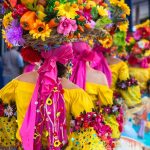Casabe: ancestral bread declared UNESCO World Heritage

Santo Domingo.- Casabe, a crunchy flatbread of indigenous origin made from yuca (cassava), has been added to UNESCO’s Intangible Cultural Heritage of Humanity list. This versatile food, popular across Venezuela, Cuba, the Dominican Republic, Haiti, and Honduras, has roots in pre-Columbian traditions and continues to play a significant role in local cuisines.
Prepared by grating yuca, removing its moisture, and cooking it on a hot metal surface, casabe is larger than traditional tortillas and is either white or golden, depending on toasting. It is a staple in traditional cooking and is gaining popularity in gluten-free markets. Known as “Indian bread” by Spanish colonizers, casabe became a reliable substitute for wheat bread in the Americas. In the Dominican Republic, the proverb “for lack of bread, casabe” reflects its historical importance.
Casabe remains central to various cuisines, such as the Garifuna community’s seafood dishes in Honduras and coastal fare in Venezuela. Vendors like Maritza Zambrano, who grew up making and selling casabe in Caracas, celebrate its inclusion on UNESCO’s list as a milestone for this ancient food. With its cultural significance now globally recognized, casabe continues to thrive as both a culinary tradition and a modern gluten-free option.
















Yum yum, I can’t wait to eat a slice of buttered Casabe!